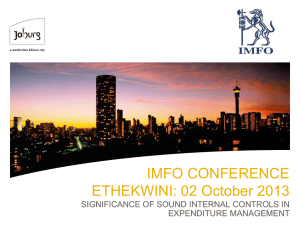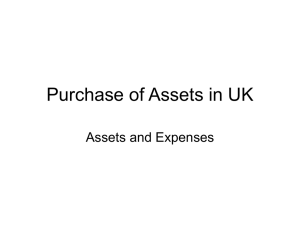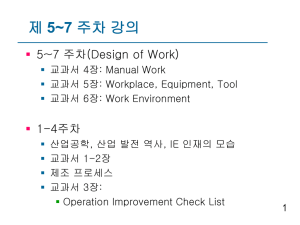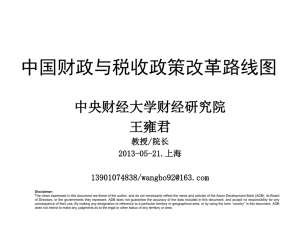File
advertisement
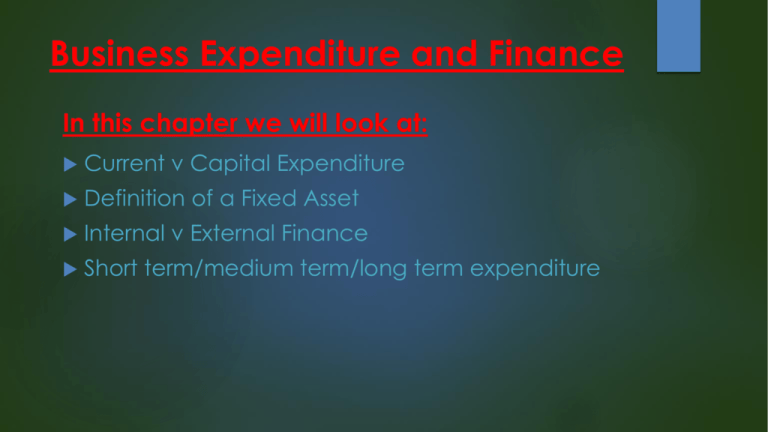
Business Expenditure and Finance In this chapter we will look at: Current v Capital Expenditure Definition of a Fixed Asset Internal v External Finance Short term/medium term/long term expenditure Questions to consider What is the difference between current and capital expenditure with examples for each? What is the difference between internal and external finance with an example for each? What is the difference between shortterm/medium-term/long-term expenditure. Discuss 3 examples of short-term/mediumterm/long-term expenditure. BELIEVE IT OR NOT….SOME OF THIS STUFF WILL BE REVISION OF WHAT WE LOOKED AT IN PREVIOUS CHAPTERS Current v Capital Expenditure A business needs money to finance its expenditure. This money goes towards day to day items (current) and long term items (capital). Can you remember these definitions with examples? Take 2 minutes to find them on your I-Pad. ( You can look at the next 2 slides for help if you need it) From Our Expenditure Chapter 2 From Our Expenditure Chapter 2 Note- Another word for a long term asset is a FIXED ASSET- as its value doesn’t change with day-day activitye.g. machine. Therefore…. Current expenditure is known as short- term (up to a year) Capital expenditure is known as medium- term (will be replaced every 3-5 years) or long- term (for the long term future) expenditure Drag the following boxes into Short-Term/ Medium- Term/ Long- Term Expenditure Short Term Wages Medium Term Electricity Bill Land Petrol Photocopier Factory Buildings Stationary Long Term Delivery Van Furniture Nuclear Power Plant Computer Internal vs External A business will match its source of finance to expenditure. There is no point in taking out a mortgage to buy a pencil for your desk or trying to use a credit card to pay for a few acres of land. You assess what you need and what source of finance suits you best. Therefore, you must decide what source of finance you will use that will best benefit your company. These sources can be internal- as the money comes from inside the company )e.g. profits/ shares, or external- as the money comes from outside the company- e.g. bank loan. Firms Own Cash Internal Creditors Extrenal Short-Term Finance Bank Overdraft External Accruals External Factoring of Debtors External Short- Term Finance Own Cash: This is the firm using their own money available to pay for goods and services. You should take into account the opportunity cost of having the money in the bank earning interest. Creditors: A creditor is a firm that supplies goods on credit- you buy now, pay later. A company therefore gets use of a good now and pays for it at a later date. This will free up cash to be used elsewhere in the business and allows you to pay for goods at a later date. Be careful as you owe creditors back the money once goods are sold. Bank Overdraft: An agreement with the bank to overdraw and repay at a later date( see banking chapter). Factoring of Debtors: A debtor is a person who owes us money and we are their creditor. Sometimes companies will need cash ASAP and what factoring does is buy the debt off you for less cash and then they will collect the full debt when it is due, giving you less money than your owed, but instant access to cash. Accruals: Delay the payment of bills until the very latest time possible in order to keep money in your bank account. Leasing External Medium-Term Finance Hire Purchase External Term Loan (External) Medium-Term Finance Term Loan: Borrowing money from the bank to purchase an assest. Be mindful of interest rates Taken from Personal Saving and Credit Purchasing Chapter Debentures External Shares Internal Long-Term Loan Extrenal Retained Profits Internal Long- Term Finance Grants External Sale and Leaseback External Long- Term Finance Shares: The firm sells shares to the public and uses the cash to pay for things. Any profits made are shared to the public Long-Term Loans: This would be like a mortgage over a period of over 20 years. Repayments would need to be paid Retained Profits: This is putting the firms profits back into the company Debentures: A certificate issued that is secured against a long term debt. Interest is also paid Sale and Leaseback: This is the selling of an assest and leasing back over time. The firm receives a large injection of cash and the rent back the property. Grant: This comes from the government. It is used to set up or expand the business

